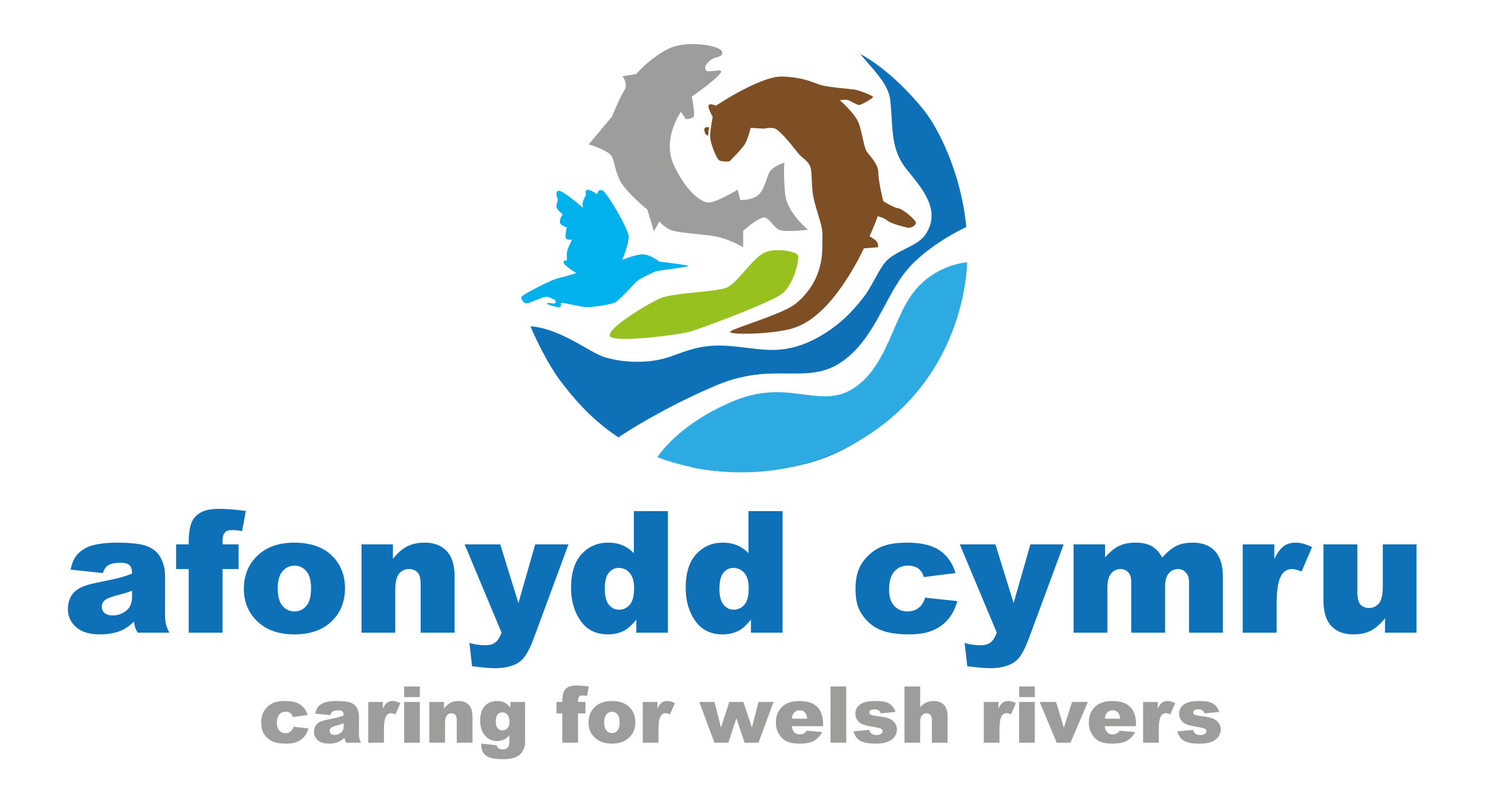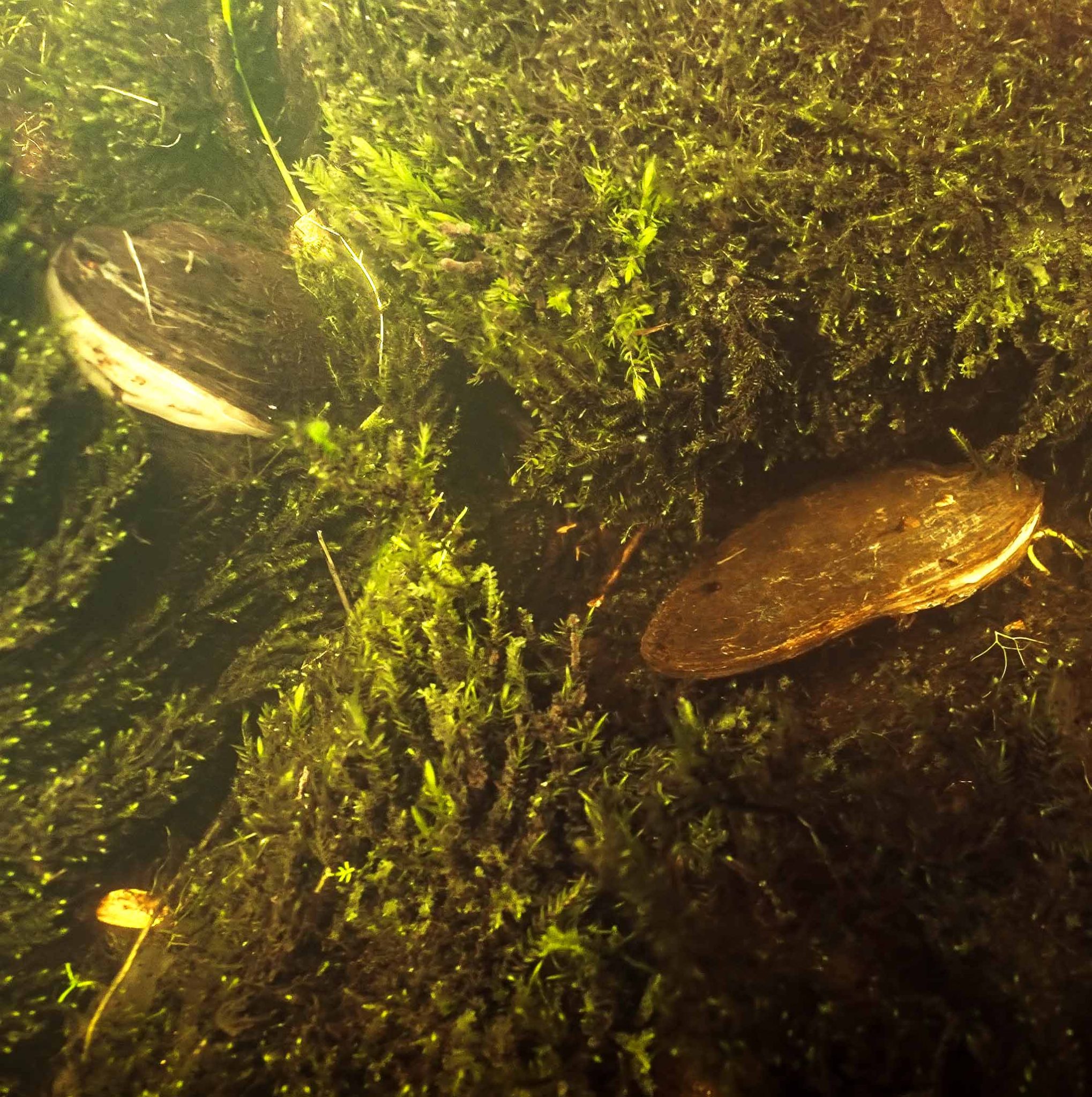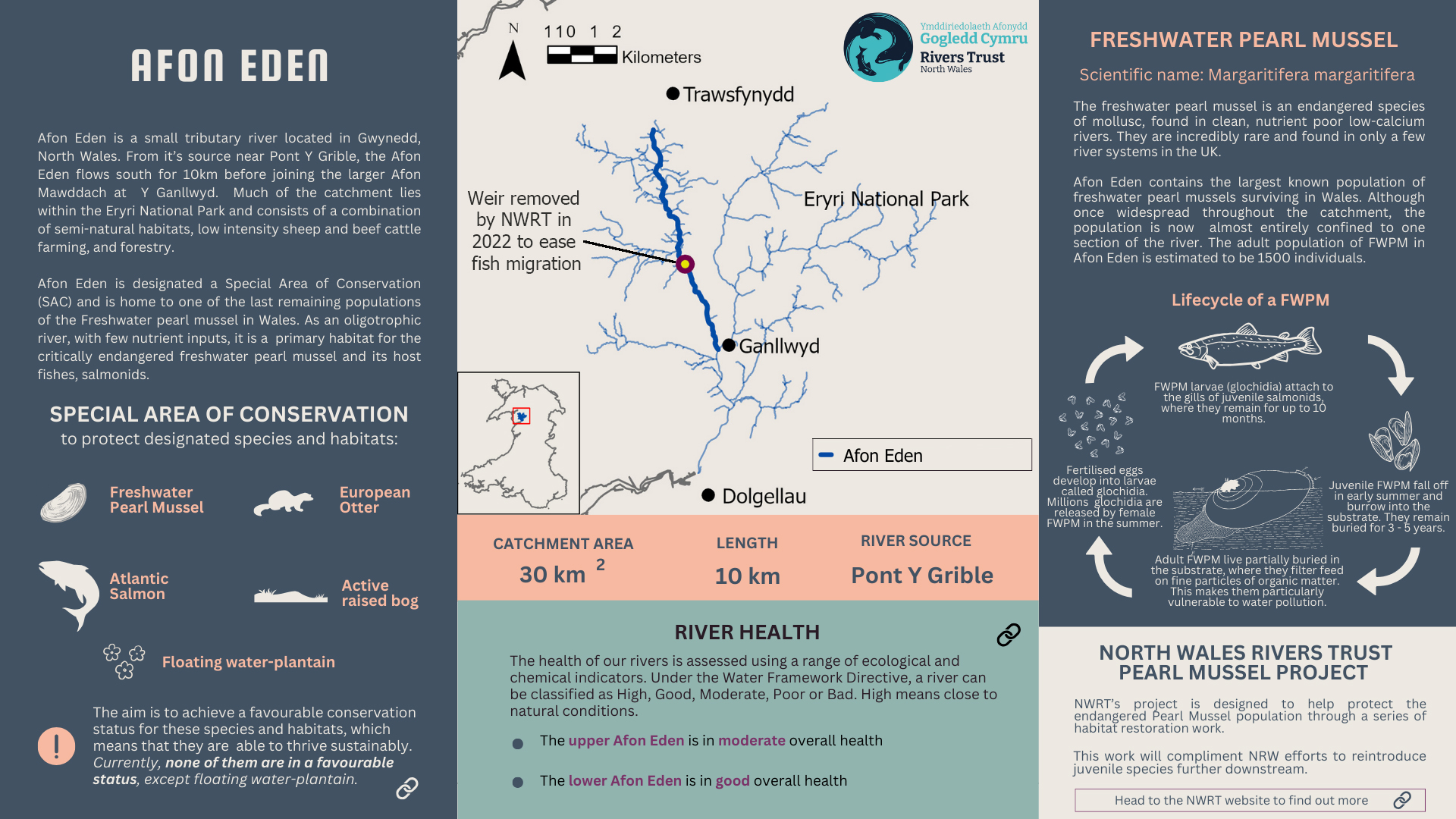April 2024
In the dark, peaty waters of a river in North Wales lives a creature that is said to be one of the reasons why the Romans first came to our shores. In the second century AD, the historian Suetonius wrote that Julius Ceasar’s two invasions of Britain in 55 and 54BC were motivated by a search for precious metals and, in particular, by the Emperor’s fascination for pearls.
At the time, the Freshwater pearl mussel (Margaritifera margaritifera) was common throughout northern and western Britain, including in many of the rivers in Wales. Although only one in every several thousand mussels contains a pearl, there was widespread commercial exploitation of them up until the 1800s. The Crown of Scotland (made in 1540) contains sixty-nine freshwater pearls, signs perhaps of the mollusc’s then relative abundance and the medieval monarchy’s ability to appropriate wealth.
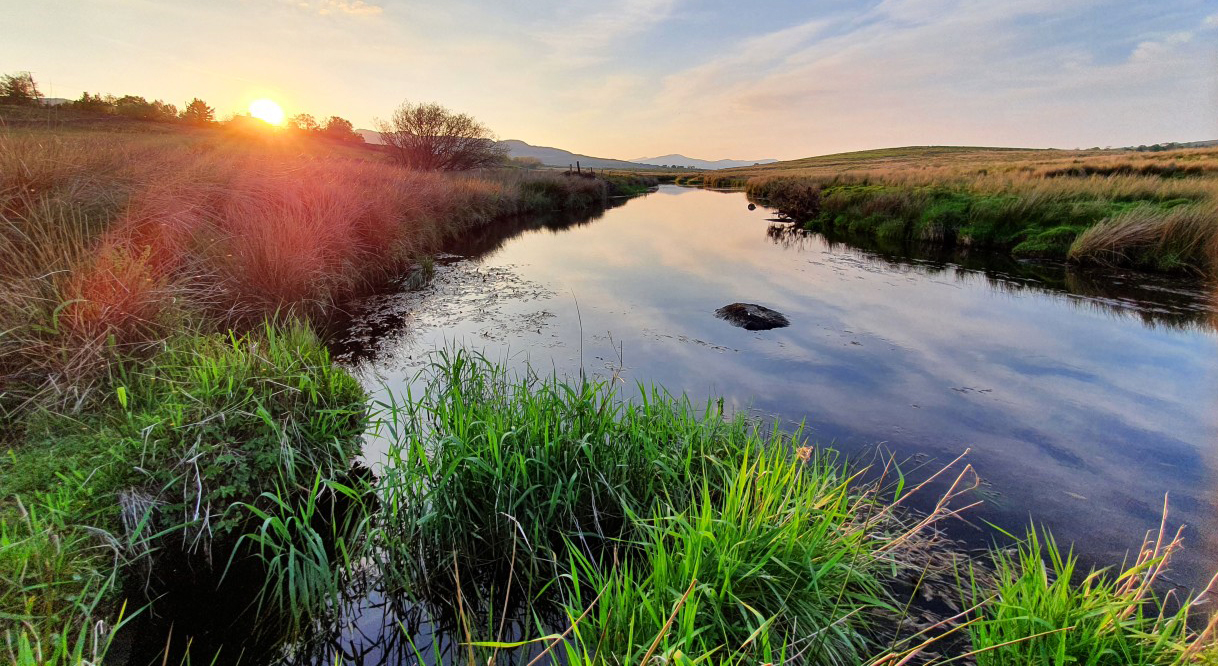
The Afon Eden with The Rhinogydd (Rhinog Mountains) in the background. Photo: Fishing Passport
Freshwater pearl mussels (Margaritifera margaritifera) in the Afon Eden. Photo: Hollie Harmswoth
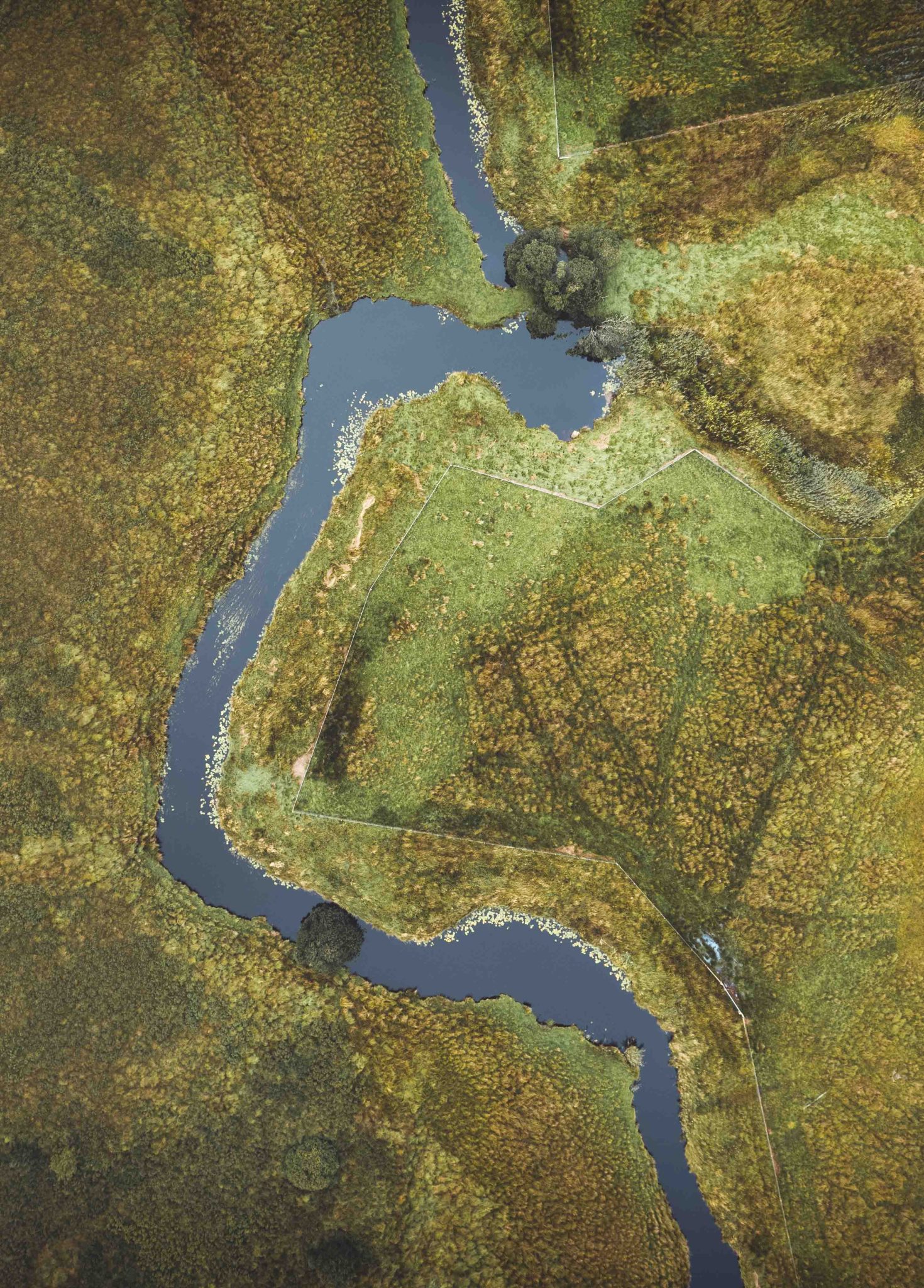
Afon Eden from above. Photo: Hollie Harmsworth
Downloadable factsheet for the Afon Eden.
Fixed to sandy or gravel beds in fast flowing, well-oxygenated and clean rivers, the pearl mussel is a fascinating species that can live for well over 100 years. In spring and early summer, each adult female mussel releases up to four million larvae into the water.
When breathed in by a passing salmon or trout, these larvae attach themselves to a fish’s gills, where they stay fixed (apparently doing them no harm) before dropping off up to 10 months later.
Migrating upstream to breed in late autumn and winter, salmonids will rarely be in the same location by the time the larvae are ready to detach and begin the next stage of their life-cycle.
This would appear to be quite a sound reproductive strategy. Sadly though, Freshwater pearl mussels are now on the IUCN Red List species and are classified as critically endangered throughout their range in Europe.
While Scotland is still something of a stronghold, they remain in only a handful of rivers in Wales. Pearl fishing, pollution, acidification, organic enrichment, siltation, climate change and declining numbers of salmonids are all thought to be the main factors for their decline. The small number of mussels in the Afon Eden are now Wales’s only viable population.
Afon Eden
The river’s source is just south of Llyn Trawsfynydd from where it flows in a generally southerly direction for around seven miles before joining the Afon Mawddach at Ganllwyd. Character-wise it is something of a river in reverse ““ the upper sections are relatively slow-flowing while the lower reaches plunge more steeply through a rocky gorge.
The Afon Eden is a Special Area of Conservation (SAC) and Site of Special Scientific Interest (SSSI) throughout its length with its SAC-designation primarily for the pearl mussels and Floating water-plantain (Luronium natans). Several of its feeder streams flow off the eastern flanks of the Rhinog mountains, giving the Eden the slightly acidic water that pearl mussels seem to prefer.
Saving the pearl mussels
There have been recent efforts to revive the fortunes of the species, including the wider European-funded “Pearls in Peril LIFE+ GB Project” from 2012 to 2016. But more recently, the North Wales Rivers Trust have picked up the baton in efforts to save the Afon Eden’s small but important mussel population.
In January 2023 and with funding from Welsh Government/Natural Resources Wales, Eryri National Park and LNP Cymru, the trust launched a project to help salmonid populations across the Mawddach catchment.
In addition to their dependency on the fish for reproduction, pearl mussels enjoy similar river conditions to salmonids ““ cold, clean water with riverbeds that are not covered in silt. The actions carried out by North Wales Rivers Trust in the project will, therefore, help pearl mussels too. This is especially the case when preventing siltation, which is particularly damaging to juvenile mussels if smothered by excessive amounts of fine sediment.
The trust has carried out surveys to find out where the pearl mussels are, so that disturbance could be kept to a minimum. Their locations are a closely guarded secret as illegal pearl fishing is still a risk, even if the chances of finding one (let alone one with a pearl in it) are extremely remote. They have also installed fencing and solar-powered pumps for watering troughs to keep livestock out of the river thus preventing damage to the banks, enrichment of the water, compaction of gravels and reducing siltation.
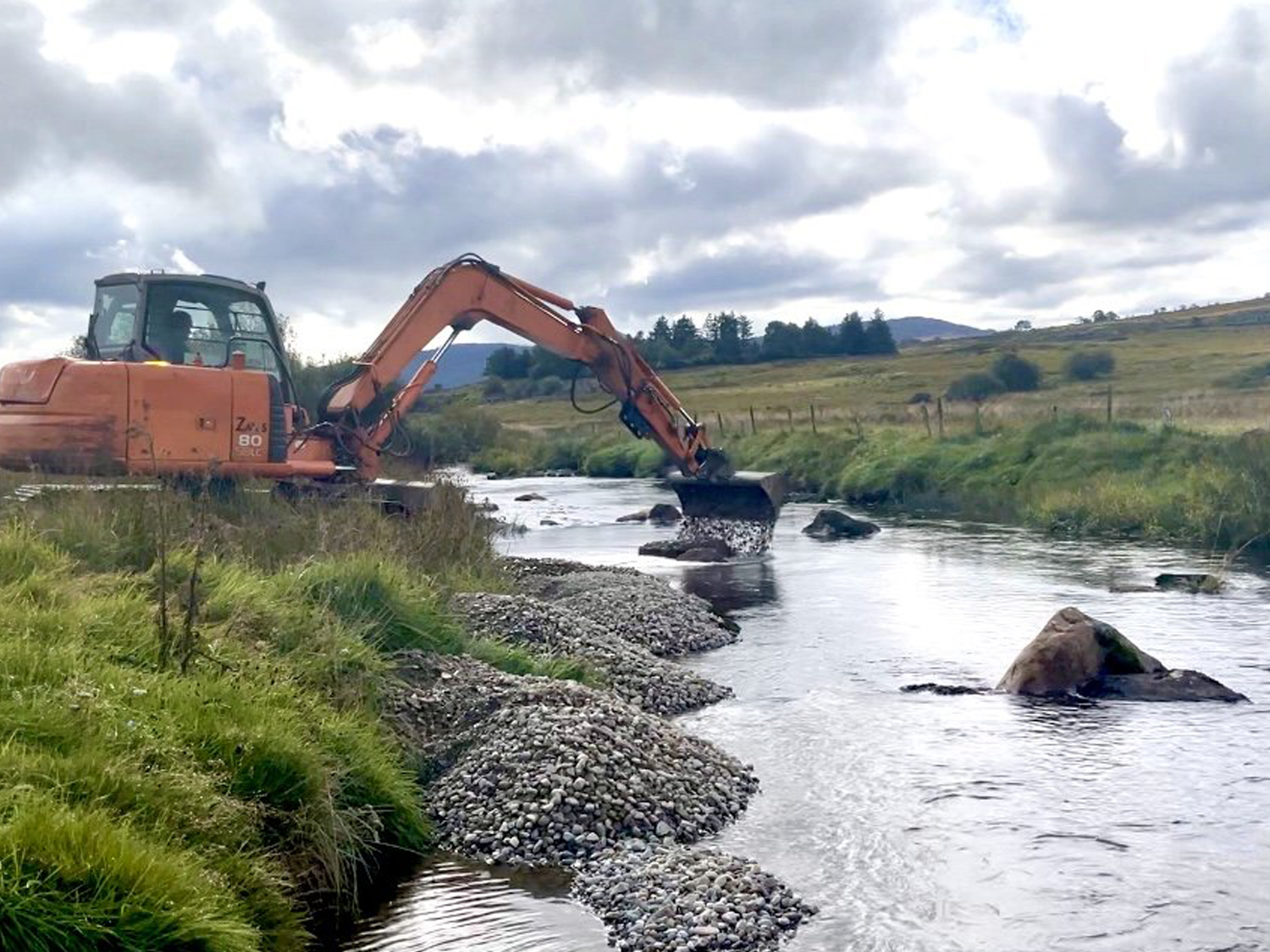

Gravel replenishment on the Afon Eden (above left) to create new salmonid juvenile and pearl mussel habitat. So far, North Wales Rivers Trust have introduced 200 tonnes of new gravel to the river, as well as reintroducing 200 previously removed boulders (above right) to normalise flows.
The photo below right is of the trust’s staff undertaking snorkel surveys of pearl mussels (photo: Hollie Harmsworth)
North Wales Rivers Trust’s work, Afon Eden
- Over 200 tonnes of new gravel introduced
- Over 200 boulders reintroduced
- One weir removed that was a barrier to fish migration
- Over 4km of riverbank fenced off with a 10m buffer strip
- Drainage ditches blocked (naturalising flows)
- Peat surveys completed
- Over 1,500 trees planted
- Regular monitoring of a CSO outflow
- Ongoing snorkel surveys and river habitat surveys for the local community
- Electrofishing surveys coming up to assess impact of last years gravels
And coming up:
- A storybook published later in 2024 about the plight of the Freshwater pearl mussels, salmon and sewin written with local school children in partnership with Prysor Anglers.
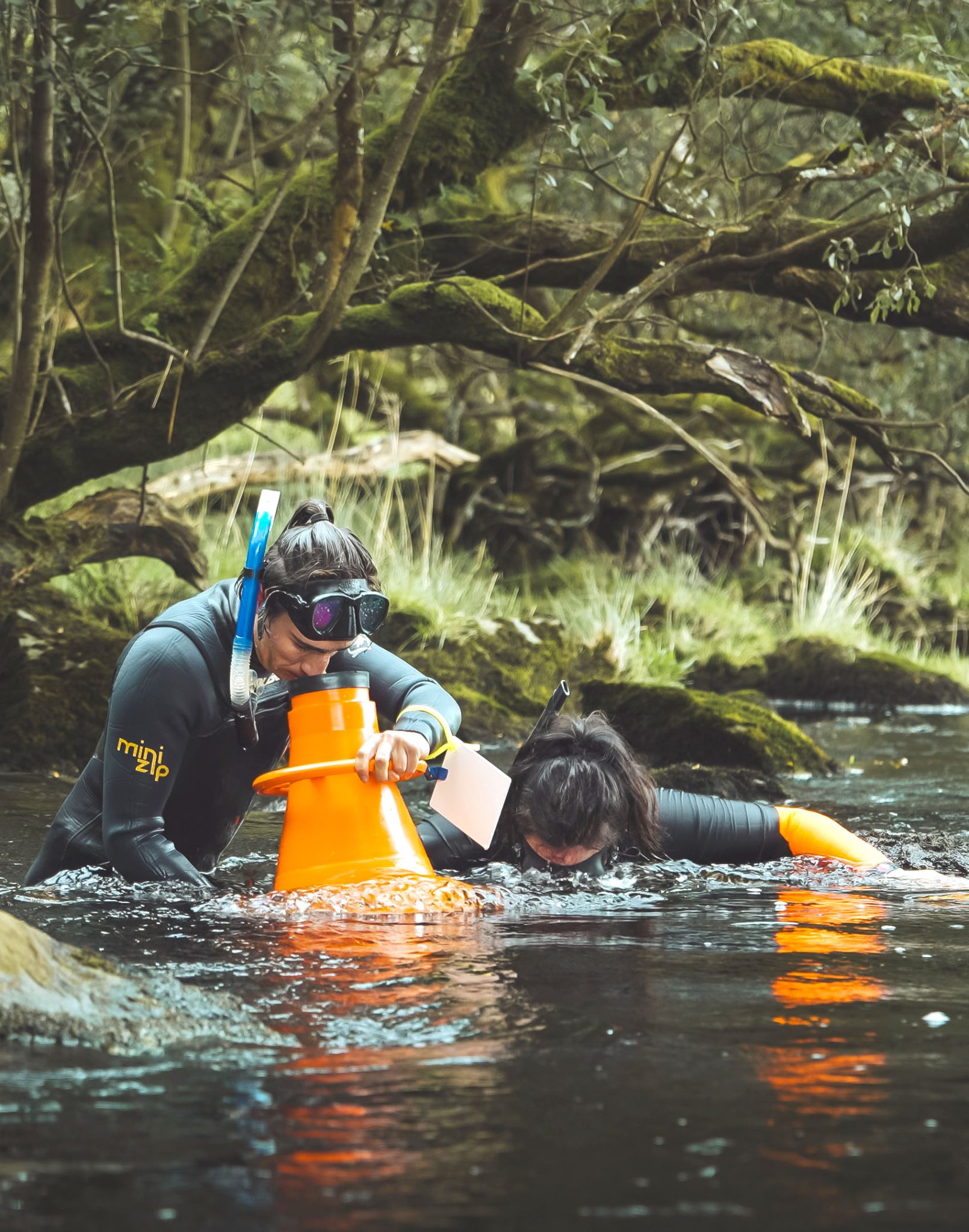
They have also introduced over 200 tonnes of new river gravel and 200 boulders to normalise flows. The new gravel beds can be used by both pearl mussels for habitat and by salmonids for spawning, with electrofishing surveys assessing the impact.
In addition, over 1,500 deciduous trees have been planted along the banks to better regulate the river’s water temperature and to provide the woody debris that fish populations need to thrive. Although the Afon Eden is one of the few Welsh SAC rivers currently passing its phosphate targets, North Wales Rivers Trust have also begun a comprehensive monitoring program of septic tanks while also raising awareness about the importance of their effective maintenance among the local community.
While Natural Resources Wales’s captive breeding schemes will attempt to re-establish populations in the Eden and other Welsh rivers, added together the trust hopes these measures will be enough to help save the river’s pearl mussels.
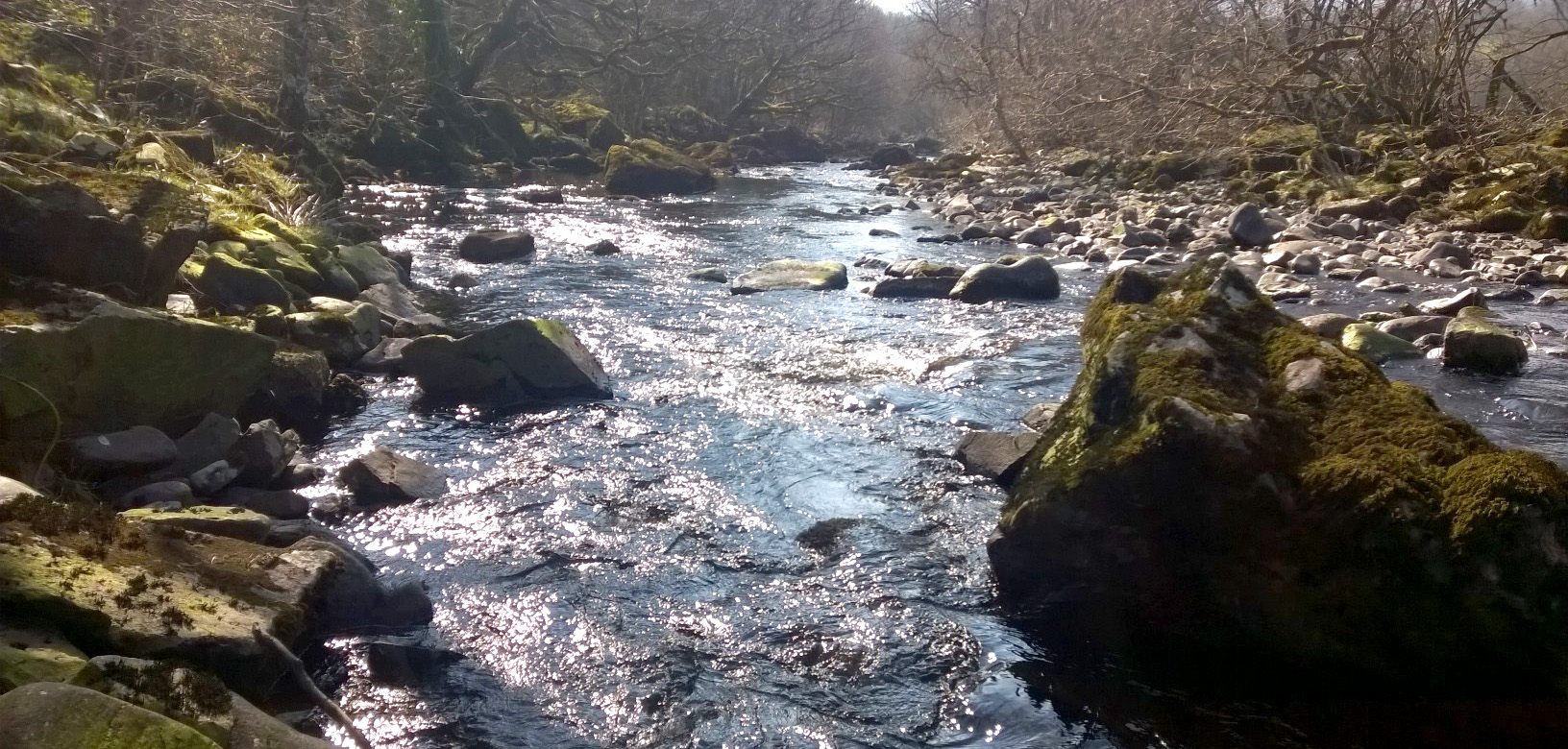
The lower reaches of the Afon Eden, where it is a much more high gradient and faster stream. Photo: Prysor Angling Association via The Fishing Passport
Our thanks to North Wales Rivers Trust for their help and to Hollie Harmsworth for photography.
References & More Information:
“Reviving Fish Spawning Grounds” – North Wales Rivers Trust
“120 more trees planted along the Afon Eden” North Wales Rivers Trust
“Local school onboard with Fresh Water Pearl Mussel project” North Wales Rivers Trust
“Exploring Conservation and Creativity at Ysgol Bro Hedd Wyn” North Wales Rivers Trust
IUCN Red List – Freshwater Pearl Mussel
JNCC: Afon Eden – Cors Goch Trawsfynydd
JNCC: Freshwater pearl mussel Margaritifera margaritifera
Natural Resources Wales: “Compliance Assessment of Welsh
River SACs against Phosphorus Targets”
Natural Resources Wales: “Core Management Plan
Including Conservation Objectives For: Afon Eden ““ Cors Goch
Trawsfynydd SAC”
“Fresh Water Pearl Mussel” Game & Wildlife Conservancy Trust blog
BBC Earth: “Freshwater pearl mussels: Scotland’s little-known royal gem
